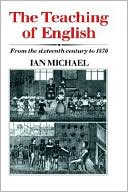

 |

|

The average rating for The Teaching of English: From the Sixteenth Century to 1870 based on 2 reviews is 3 stars.
Review # 1 was written on 2011-01-03 00:00:00 Jacob Conrad Jacob ConradAn excellent teaching companion for graduate courses. |
Review # 2 was written on 2020-08-27 00:00:00 Vaughn Ford Vaughn FordI have read and taught this book several times. I first read it in 1974 (! True! I know! I look so youthful for my age!) when I was myself preparing to become an English teacher. It was work I read in a Philosophy of Education class, where Dewey's progressivism/experimentalism was opposed to essentialism (a more conservative approach to the classroom). And here we still see Dewey read by millions of future teachers to help them envision a classroom connected to student experience, to local communities and contexts vs. the more standardized approach we see today. His view is responsive to actual human beings and their needs vs. paternalistically assuming what "everyone needs". He wrote something like 90 books, and many of them, including this one, written as they are by a philosopher--even if a pragmatist philosopher--more than a century ago, are rather dry, meticulously crafted, but sometimes a little boring, I'll admit it, a little creaky, and sometimes problematic in his conceptions from time to time (i.e., he talks in the abstract of "savages" in a couple of places, which would not have been shocking in his day but would now be unacceptable). But some of the insights and ideas about progressive education are still astonishing and feel in present in the "Common Core" world of today's schooling, revolutionary. Learning by doing? That's Dewey. He largely invented that phrase, that approach with respect to schooling (though others historically have approached learning in this way, of course). The democratic classroom. His idea. When he was close to the end, he was asked to summarize his career, and he uncharacteristically pithily said, "Democracy is conversation." So people can't ONLY learn by being the repositories of Great Professorial Lecturers (though we can all name great ones we learned from); we have to talk. Learning is social, the self you are continually becoming is social and growing, socially constructed and not prefigured completely by genetics. "Education is not preparation for life; education is life itself." Dewey! "Every great advance in science has issued from a new audacity of imagination." Dewey! "Arriving at one goal is the starting point to another." Dewey! "Were all instructors to realize that the quality of mental process, not the production of correct answers, is the measure of educative growth something hardly less than a revolution in teaching would be worked." Dewey! "We only think when we are confronted with problems." Dewey! "All genuine learning comes through experience." John Dewey |
CAN'T FIND WHAT YOU'RE LOOKING FOR? CLICK HERE!!!